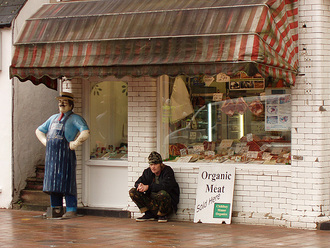
Now comes a related study from Stanford University that says organic foods, such as meat, dairy and produce, aren’t any better for you than foods grown through traditional means.
But wait, you say. Doesn’t it make sense anyway to buy from local organic farms because they’re better for the environment?
| | Not necessarily. A study from Oxford University in England received less attention in the United States than the one from Stanford, but it shows there aren’t really any environmental benefits to speak of, either. In fact, farms producing environmental milk, pork and cereals created more greenhouse gas emissions per unit compared to traditional farming methods. Organic olives and beef generated lower greenhouse gas emissions per unit, said a report from Environmental News Network. So it’s sixes. Farmers used less energy to produce food organically, but they needed more land than traditional farmers. In other words, go ahead and spend about a third more to buy organic food if you choose. Maybe you think it tastes better and the extra cost is worth it to you. But you won’t be buying any more nutrition or saving the planet. You will be helping what has become a $31.4 billion industry, however. Despite this news spreading manure all over organic food, one bit of information does underscore health concerns and deserves more attention from the federal government. The Stanford study did find significant differences in antibiotic-resistant germs in traditionally grown animals meant for human consumption. Too many farmers feed animals antibiotics to fatten them up, producing more and cheaper meat. But if you get a food-borne illness from the meat of one of these animals, your doctor will have a heck of time finding medicine to treat you. Government has a legitimate roll to play in protecting the health and well being of the population. While the Associated Press story said the feds have begun steps to curb this practice, I would recommend something aggressive and proactive. |

 RSS Feed
RSS Feed

